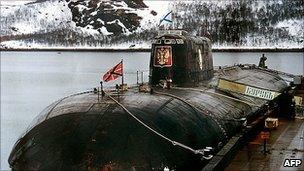Russians remember Kursk submarine disaster, 10 years on
- Published
People lay flowers during ceremonies to remember those who died
Ceremonies are being held in Russia and on board its naval vessels to commemorate the 10th anniversary of the Kursk nuclear submarine disaster.
The submarine, one of the Russian navy's most advanced vessels, sank in the Barents Sea on 12 August, 2000 with the loss of all 118 people on board.
An explosion of fuel from an old torpedo caused the disaster.
Moscow's response to one of the greatest disasters in Russian naval history was widely criticised.
Relatives and members of Russia's northern fleet are due to cast wreaths into the sea on Thursday in memory of the crew.
Flags are being flown at half-mast at the headquarters of all Russia's naval fleets, and a ceremony and minute's silence was being held at Moscow's Central Army Museum.
Delayed response
The initial response to the disaster in 2000 was shambolic, says the BBC's Richard Galpin.
After radio contact was lost there was a still unexplained delay before a search and rescue mission was launched.
Although the submarine was lying just 100m below the surface of the sea, attempts to locate it and reach it repeatedly failed.

The Kursk was the pride of Russia's Northern Fleet
It was days before the authorities informed relatives that something was wrong and the then President, Vladimir Putin, initially remained on holiday.
Russia eventually accepted international assistance, but when Norwegian divers opened the Kursk's hatch 10 days later they found the boat flooded and everyone dead.
Many had died within seconds of the initial explosion, but others survived for several hours, a report found.
Russian officials originally suggested the submarine may have collided with a foreign ship or with a stray mine.
But it emerged that an explosion was caused by fuel that had leaked from a torpedo.
This started a fire, which subsequently caused all ammunition on board to detonate.
The boat was raised and the bodies recovered in 2001.